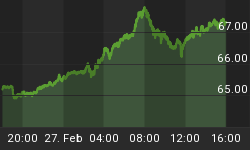The United States' financial situation is as dire as that of many European countries, yet the US Government's actions contrast sharply with the austerity measures of European governments. In the last few weeks, the Federal Reserve boosted its quantitative easing program by $600 billion and Chairman Bernanke said that he was willing to increase bond purchases even further. In addition, the White House proposed an extension of the Bush tax cuts and unemployment benefits, and a reduction in payroll taxes. Although US politicians continue to ignore the US fiscal situation, the bond market, as seen by the recent declines in bond prices, may be reacting negatively toward the free-spending ways of the Government.
This country's deficit problem is widely known. In fact, during the press conference announcing the bi-partisan agreement for extending the Bush tax cuts, Obama questioned, "...how are we going to pay for all that at a time when we've got both short-term deficit problems, medium-term deficit problems, and long-term deficit problems? Now, that's going to be a big debate." Despite acknowledging the problem, Obama and the GOP decided to move forward with the proposal. This policy decision, made in the face of mounting deficits, is similar to policy mistakes made by many European countries which, prior to their debt crises, chose not to address deficit issues. However, politicians can only ignore deficits for as long as the bond market ignores deficits. Time may be running out.
Below is a 6-month chart of the 30-year US Government interest rate. With the 30-year interest rate up nearly 1% from the low, the likelihood of a US deficit crisis has risen dramatically.
Figure 1. 30-year US Government Interest Rate
Source: Yahoo! Finance
Chairman Bernanke's objective in pursuing quantitative easing is to keep interest rates low based on his view that low interest rates are necessary for stimulating the economy, especially the housing sector. However, with Treasury bond prices falling, bond vigilantes are proving to be a force greater than the Federal Reserve, exacerbating the very problems that Bernanke is trying to fix.
Although financial markets are penalizing European countries with excessive budget deficits and US politicians are speaking candidly about the US deficit problem, the US continues to take actions that make the deficit worse. Despite the ECB and IMF supporting peripheral European countries' bond prices, interest rates have continued to rise and thus pressure the entire region's economy. Additionally, in order for countries to obtain the required bailout funding they are being forced to slash spending and raise taxes. While the US government still has complete access to market funding, the bond market will ultimately force the US to replace its current stimulative measures with austerity measures similar to those being introduced in Europe.















